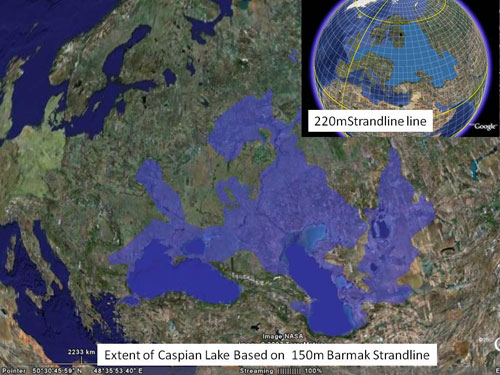E. N. Badyukova
Caspian Sea *
The Caspian Sea is not usually associated with the story of Atlantis, but as early as the 19th century Moreau de Jonnès proposed the Sea of Azov as the location of Atlantis and that the Black, Caspian and Aral Seas were just remnants of a large ocean.
In the 1920s, Reginald Fessenden promoted a similar idea [1012], supporting it with some evidence that the Caspian and Aral seas were still connected as late as 200 BC.
While this may sound like a wild idea, one modern researcher, Ronnie Gallagher, has written an important paper(b) supporting the concept (see fig.8).
Gallagher has suggested that, based on whichever data is used this enlarged body of water had been joined with the Black Sea/Mediterranean or spread even further north as far as the Arctic. His conclusions are mainly based on sets of strandlines identified at elevations of 150 and 220 metres above sea level in the region of the Caspian Sea(d). From these he extrapolated an enormous inland lake centred on the Caspian (150m) or if the 220m level is used it was a sea joined to the Arctic Sea in the North. Gallagher published a hypothetical Eurasian flood map based on these figures. However, it should be noted that Professor E. N. Badyukova has offered some critical comments regarding Gallagher’s claims(e).
In the 1950s, Sprague De Camp wrote [0194.88] of compliant scientists in Stalinist Russia claiming that Atlantis had existed on land now covered by the Caspian Sea.
Fessenden cites Strabo (Book 11:7;43), who recounts a tradition that the Caspian had been connected with the Black Sea by way of the Sea of Azov.
Modern proponents of Atlantis in the Sea of Azov have suggested(a) that at the end of the last Ice Age  floods of meltwater poured into the Caspian Sea, which in turn escaped through the Manych-Kerch Gateway(c) into what is now the Sea of Azov, but at that time contained the Plain of Atlantis!
floods of meltwater poured into the Caspian Sea, which in turn escaped through the Manych-Kerch Gateway(c) into what is now the Sea of Azov, but at that time contained the Plain of Atlantis!
Immediately to the south of the Caspian are the Caucasus Mountains which have also had links with Atlantis proposed.
(a) https://atlantis-today.com
(b) Wayback Machine (archive.org) *

